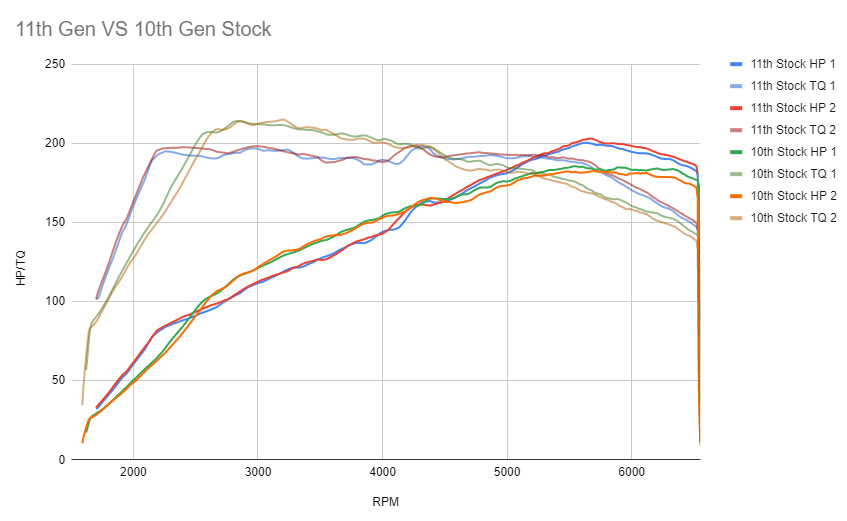
Last week we picked up our Sonic Gray Pearl 2022 Honda Civic Si (FE1). We will be using this vehicle test, develop and install our products in an effort to continue pushing Honda's 1.5L L15 platform.
Like all of our previous shop cars, we will be providing baseline dyno numbers to test consistency and for benchmarking as we add modifications. We used a DynoJet 224X here for an apples-to-apples comparison of our previous results. During our testing, Ambient Temperature was 63°F, with 66% Humidity and a Barometric Pressure of 28.5 Hg at 1170 ft Elevation.
Over the past few days we have seen dyno results indicating that the 11th Gen Si outshines the 10th Gen Si in terms of peak power delivery. To make things more interesting than our typical baseline testing, we thought it'd be useful to overlay the graphs and show the differences in power delivery between the two siblings. The graphs below compare a stock 11th Gen Si to a stock 10th Gen Si.

First and foremost, we were having issues obtaining a clean and consistent tach signal, which is why the 11th Gen data has some odd looking fluctuation. Shown below is the exact same data exported to Excel where our engineers were able to filter out the unwanted data for a cleaner looking graph.

All dyno runs to are 4th gear pulls with identical coolant temps and knock values using untuned factory Honda ECU mapping.
- 100% Stock 2022 Civic Si Baseline: 203 hp & 199 ft/lbs tq
- 100% Stock 2017 Civic Si Baseline: 186 hp & 215 ft/lbs tq
Also for reference, our 100% stock 2022 Civic EX baselined a best of 171 WHP on the same rollers.
Right off the bat, we can see that the 11th Gen is making considerably more peak horsepower (a maximum difference of 19WHP and 20WTQ). This is due to Honda’s utilization of a twin scroll turbo (this term can be used loosely, we'll discuss this at a later date), dual port head, and the current generation having VTEC on the intake and exhaust side, which allows the head to flow much better at high rpm. This is also demonstrated by the horsepower and torque bump at peak boost, around 4200 RPM, whereas the 10th Gen torque curve begins to dramatically fall off as RPM increases.
It is worth mentioning that the 11th Gen seems to provide less overall midrange power (most likely in an effort to increase clutch and connecting rod life). Despite making more power sooner due to the twin scroll turbo design, the 10th Gen provides a beefier midrange between 2500 RPM and 4200 RPM. Digging into the data logs for both cars, we noticed some significant differences in the stock tunes in both cars. Comparing both cars at 3500 RPM, the stock 10th Gen tune runs 1 more pound of boost, 2 more degrees of timing and has a more optimum air-fuel ratio for performance at this RPM. However at peak power, the 11th gen make 1.2 more pounds of boost, 1 more degree of timing and they are both commanding the same air-fuel ratio. Stay tuned for a Part 2 writeup where we graph this data out.
To sum it all up, we speculate that the 11th Gen Si will be very responsive to tuning and will likely be capable of more power than the 10th Gen.


Here are three back-to-back (all runs within 2 minutes of each other) pulls. As we can see, power begins to drop notably between runs due to heat-soak. This power loss will only be amplified when running more boost via ECU tuning. More boost out of a tiny turbocharger = higher temps. Higher temps = increased chances of knock/detonation, thus limiting power and reliability.
Run 1:
- Coolant Temp: 179.6 F Start / 186.8 F End
- IAT: 86 F Start / 69.8 F End
- IAT 2: 89.6 F Start / 95 F End
Run 2:
- Coolant Temp: 190.4 F Start / 208.4 F End
- IAT: 78.8 F Start / 75.2 F End
- IAT 2: 100.4 F Start / 114.8 F End
Run 3:
- Coolant Temp: 203 F Start / 213.8 F End
- IAT: 84.2 F Start / 96.8 F End
- IAT 2: 109.4 F Start / 118.4 F End
Much like the 10th Gen Civic platform, this chassis will benefit tremendously from an intercooler upgrade and proper intake upgrade. So far we have confirmed that the following products currently fit both Si and Non-Si Civics:
- Downpipe
- Front Pipe
- Intercooler Upgrade
- Charge Pipe Upgrade (soon to be released)
- High Volume Intercooler Outlet (soon to be released)
- Stage 1 Intake System
- Stock Replacement Intake Hose
- High Flow Drop-In Air Filter
- Resonator Delete Kit
Though these products have already been tested using a 2022 Civic EX, our team will be installing and testing these products on our Si in upcoming weeks.




